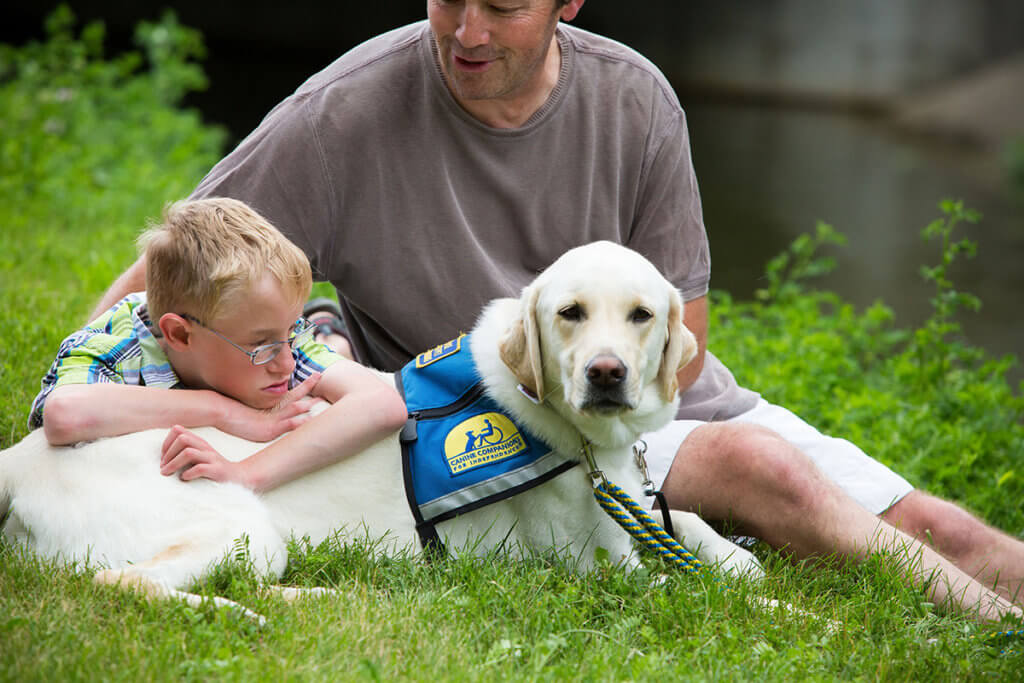
As the number of children being diagnosed with autism spectrum disorder continues to rise, so does the demand for a popular treatment – service dogs. Yet, even though the number of service dogs being provided for children with autism is growing, there is a lack of scientific evidence on whether, or how, these dogs help. In addition, minimal research has explored how these dogs may help parents – who often face significant stress and challenges of their own. A group of Purdue Veterinary Medicine researchers is launching a new study this fall to find out.
The study, called the Purdue Canines for Autism Research Study, or Purdue CARES, is being led by Dr. Maggie O’Haire and graduate student Kerri Rodriguez from the Center for the Human-Animal Bond, in collaboration with the Purdue Autism Research Center, Arizona University, and Canine Companions for Independence. Funding includes an $85,000 grant from the Human-Animal Bond Research Institute.
“With so many emerging complementary and integrative treatments for autism, it is critical to better understand how this increasingly popular practice affects children with autism and their families,” said Dr. O’Haire, who holds a faculty appointment as associate professor of human-animal interaction in the College of Veterinary Medicine’s Department of Comparative Pathobiology.
Through this study, Dr. O’Haire and Rodriguez hope to address some of the gaps when it comes to treatment options for children diagnosed with autism. Right now, a lack of scientific evidence on the effectiveness of service dogs leaves more questions than answers.
“In the absence of this information, families and clinicians do not have an evidence base to draw upon to know what to expect,” Dr. O’Haire said. “There remains a critical need to empirically quantify the effects of autism service dogs, not only on clinically-relevant outcomes for children with autism, but also on caregiver and family functioning.”
One in 59 children is diagnosed with an autism spectrum disorder, according to the Centers for Disease Control and Prevention. The study will focus on children diagnosed with autism who range from ages four to 17 and will compare the symptoms of children who currently have service dogs in the home and those who are on a waiting list for a service dog. Researchers also will assess participants’ cortisol levels, a biomarker involved in the stress response system, as well as reports of their sleep habits provided by their caregivers.
Up to 100 participants will be recruited from Canine Companions for Independence, one of the largest providers of assistance dogs in the United States. Service dogs provided by Canine Companions for Independence are purpose-bred Golden Retrievers, Labrador Retrievers, or Golden-Labrador crosses specifically trained for skills and tasks that help mitigate the child’s autism symptoms.
“We see the positive impact of Canine Companions’ assistance dogs on children with autism as early as the very first night with the dog,” said Paige Mazzoni, Canine Companions CEO. “The collaborative research study with Purdue on the effects of task-trained service dogs for these children and their families can help offer insight into innovative approaches to autism from a therapeutic and social perspective. This important national study is one of the first of its kind, and as leaders in the assistance dog industry, Canine Companions is uniquely positioned to make a study of this magnitude possible.”
The study also will evaluate the impact service dogs have on caregiver and family functioning through a caregiver report.
“We are excited to take a family-wide approach to studying how an autism service dog integrates into the home,” Rodriguez said. “Specifically, our innovative study will not only measure the effects that a service dog may have on child functioning, but also the parents’ functioning and overall family dynamics.”
The work aligns with Purdue’s Giant Leaps celebration, acknowledging the University’s global advancements made in health, longevity, and quality of life as part of Purdue’s 150th anniversary. This is one of the four themes of the yearlong celebration’s Ideas Festival, designed to showcase Purdue as an intellectual center solving real-world issues.
More information about the study, including eligibility information and links for interested families and current participants, is available at the Purdue CARES website (www.PurdueCARES.org).
